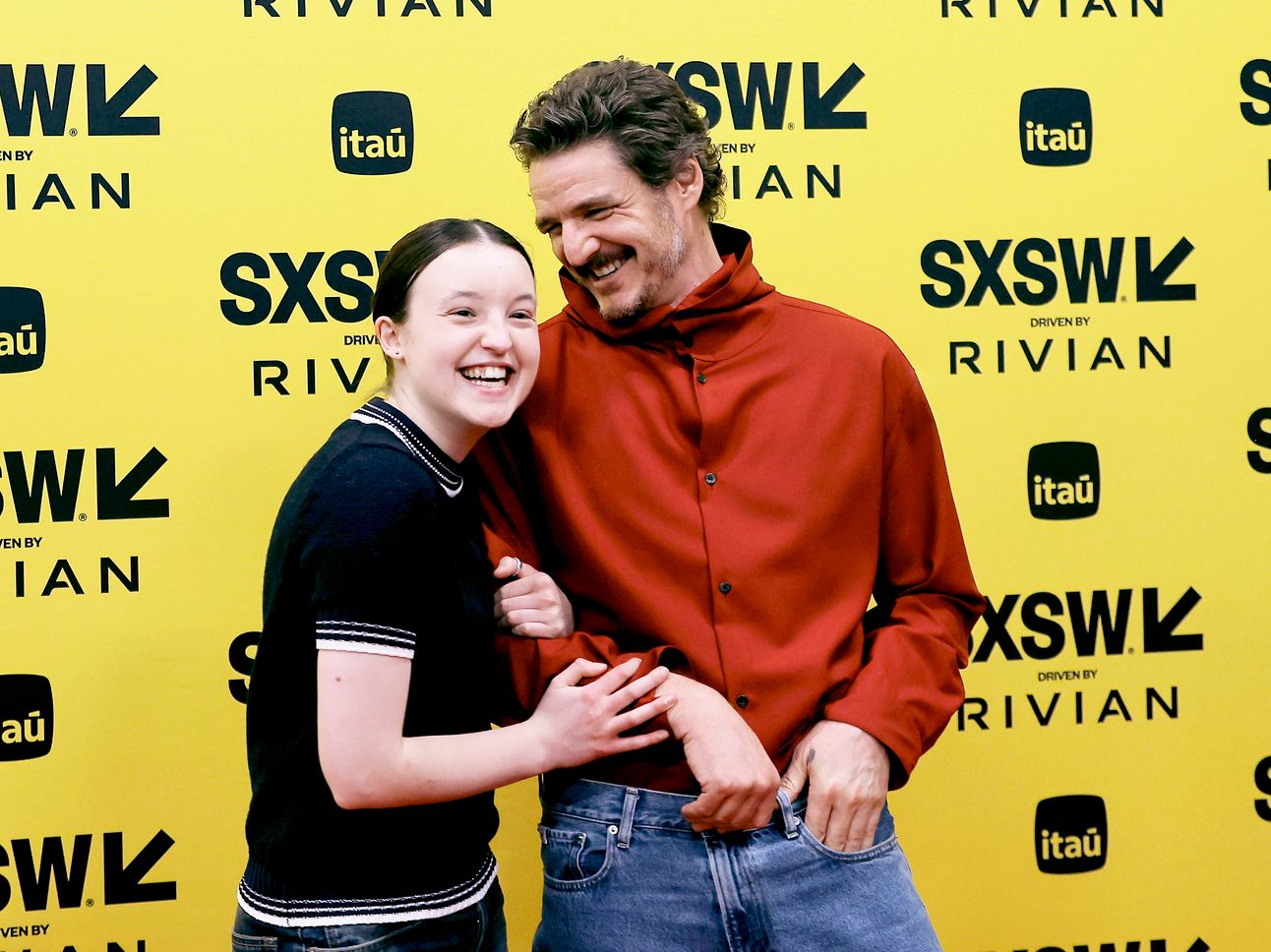
Bella Ramsey attends the Los Angeles Premiere of HBO Original Series "The Last of Us" Season 2 at TCL Chinese Theater on March 24, 2025 in Hollywood, California. (Photo by Axelle/Bauer-Griffin/FilmMagic)
Welcome back to Spitfire News! If you haven’t already, you can subscribe for free to get these dispatches delivered to your inbox. If you want to read paywalled stories and get other perks, consider a $5 subscription! Today’s article is free with reader support.
Warning: This piece contains spoilers for “The Last of Us” season 2.
I’ve been watching The Last of Us on HBO or Max or whatever you want to call it since it premiered in 2023. I never played the video games, but I was immediately hooked on the show. Zombies are one of my all-time favorite genres, and it’s a great series.
I didn’t know much about the characters or cast going in, but the main female character being a lesbian was also a very pleasant surprise. Season 2 has expanded on developing Ellie’s romantic relationships and the challenges she faces because of her sexuality. Although I don’t think the writing is perfect, there’s a lot to love. And the actor playing Ellie, Bella Ramsey, is a force onscreen.
But if you don’t watch The Last of Us and you just hear about the show on Reddit or through certain viral social media posts, you might walk away with a different impression. That’s because part of the internet and the franchise’s fandom has been straight-up evil toward Ramsey since they were cast (Ramsey identifies as nonbinary and prefers they/them pronouns), with a noticeable uptick in the online abuse during season 2.
This falls into a well-established pattern, one that has had clear ramifications beyond fandom and social media. But before I go on, let me interrupt myself with a few links of things I’ve been reading and appearing on this week.
My debut piece for WIRED about pro-eating disorder content on TikTok just came out today, featuring some unorthodox and very online methods for combatting the toxic culture.
I joined an episode of In Bed With The Right, an essential podcast about conservatism, gender, sex, and sexuality from Moira Donegan and Adrian Daub. We talked about the Depp v. Heard trial and its lasting legacy in the reactionary backlash to the Me Too movement.
With everything else going on, it may seem frivolous to focus on how people are reacting to a nonbinary lead of a lesbian zombie show. But to ignore it would be to ignore how much these cultural backlashes have proven to affect everything else. The abuse toward Ramsey is reminiscent of Gamergate, the gamer-led misogynistic harassment campaigns that redefined the culture war playbook for the Trump era. It feels like déjà vu of how toxic, overwhelmingly male fans of franchises like Star Wars and Marvel treat women and marginalized people in modern iterations. Trump supporters still bring up Star Wars going “woke” in their rants. Even if you couldn’t draw a straight line between fandom bigotry and conservative politics, this is still another example of online-driven mob violence to harm marginalized people.
It’s exhausting to be a woman, let alone a queer woman, who has to see this shit. I’m so fed up of seeing mainly the actresses in my favorite shows get harassed into submission. It happened with Erin Moriarty, the female lead in Amazon’s superhero adaptation The Boys, who has faced relentless bullying about her appearance and acting. Moriarty is a cis blonde white woman who has not disclosed her sexuality and perfectly adheres to the beauty standard, and that didn’t protect her from the abusive behavior of mostly male superhero fans. She has spoken out about the need for feminism at the studio level and how the online harassment caused her to spiral, quit Instagram, and fear for her career. This is how male fans can use their collective power and digital platforms to harm the women they feel threatened by.
From the second Ramsey was cast as Ellie in The Last of Us, misogynistic fans could be found complaining that the teenager wasn’t conventionally attractive enough. But Ramsey and the character they played were both underage, so the more acceptable critique was that Ramsey didn’t match Ellie’s fictional appearance in the game. And before the TV adaption, The Last of Us Part II players review-bombed the sequel for daring to include trans, Black, lesbian, and gender non-conforming characters. Based on that trajectory, it’s no surprise that Ramsey is getting more abuse now that they are of legal drinking age, their character is hooking up with other women onscreen, and they have commanded more of the plot after the other main character, Joel, was killed off. They, too, have deleted their Instagram account. In addition to attacks on their gender identity, their queerness, their characters’s queerness, and their appearance, Ramsey has been widely criticized for being a bad actor. While subjective, I don’t agree, and I think the dramatic extent of this criticism is rooted in bad faith.

Bella Ramsey and Pedro Pascal attend "The Last of Us: Cast and Creators on season 2" panel during SXSW at Austin Convention Center on March 08, 2025 in Austin, Texas. (Photo by Tibrina Hobson/Getty Images)
Online harassment works at both an individual and widespread level. It punishes specific victims, with those who are more marginalized being more vulnerable as a result. It forces victims to retreat from public life, an assault on their ability to exist in the world equally and freely. It undermines democracy. And it serves as a threat and deterrent to everyone who falls under the same lines of marginalization.
For my own sake, I try to stay away from online hotbeds of misogyny and other bigotry when I’m not reporting on them. But as The Last of Us season 2 aired, I could no longer avoid the abuse. On my Reddit homepage, which I visit every day, usually multiple times a day, I was repeatedly recommended cruel posts about Ramsey from fandom subreddits. It was so mentally jarring that I used Reddit’s tools to remove one of the subreddits from my recommendations. But I still saw the hate, and I saw other people on Reddit talking about how bad it was. This was a broad weaponization of the platform to make people like me and many others feel uncomfortable and unwelcome, to remind us that our gender and sexuality and appearance can be used to subordinate us. It is a psychological attack and a way to ensure fandom spaces and the internet more broadly reflect and reinforce patriarchy.
Fandom is powerful. It is one of the most potent and popular forms of community today, especially online, where people spend more and more of their time. Fandom has always included women and other marginalized genders, as well as the entire spectrum of people. In fact, women and marginalized people have always been some of the biggest drivers of fandom, using it as a vehicle to imagine and create their visions of what the world can be. The power inherent to fandom and fiction is why men and conservatives and people who benefit from the status quo want to conquer it and use it for their own agendas. It’s why fandom has been the battleground of so many culture wars, which can leave devastation in their wake.
This is one of the ways oppression works, insidiously, through means which other people will misinterpret as frivolous and unimportant. But for Ramsey, the backlash against their gender identity has led “part” of them to regret coming out at all. This is an all-too-familiar experience for queer, trans, and nonbinary people. There’s an avalanche of hate designed to punish us for living truthfully and make other people like us reconsider whether they should dare.
Increasingly, studios have bent to the will of toxic fans, going so far as to form “focus groups” where the diverse people who will offend bigoted sensibilities can be identified and removed. The team behind The Last of Us clearly doesn’t align with a worldview that penalizes Ramsey for their existence. But the corporate interests profiting from the show’s success and Ramsey’s undeniable star power should be doing more. They should make their support of Ramsey and their condemnation of bigoted bullying louder.
Social media platforms, too, have a responsibility to curb the abuse. This week, Reddit banned one of the biggest subreddit offenders. The stated reason was spam. Reddit didn’t respond to a request for comment asking for more details.
There are many other people in the The Last of Us fandom who celebrate Ramsey. Fandom spaces have been instrumental in pushing people in a more progressive political direction when diverse characters and creators and their fans have freedom to thrive. But when fandom spaces are corrupted by hate, they contribute to our political and cultural pendulum swing toward the right. Marginalized fans deserve better. Ramsey deserves better. And so do all of us who see a part of ourselves represented in their performance of Ellie.

